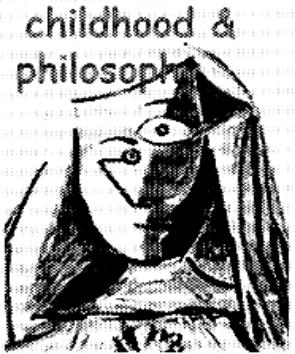shaping inclusion: possibility of “community of inquiry” in people with intellectual disabilities
DOI:
https://doi.org/10.12957/childphilo.2025.89466Palabras clave:
inclusión, discapacidad intelectual, etnometodología y análisis de conversaciones, cuidadoResumen
Este estudio tuvo como objetivo brindar información sobre la Filosofía para/con Niñas y Niños Fp/cNN) en jóvenes con discapacidades intelectuales (DI). La conciencia del lado social constructivo de la discapacidad es necesaria para cualquier consideración sobre la posibilidad de un diálogo filosófico con personas con DI. Utilizando un estudio de caso y adoptando la etnometodología y el análisis de conversaciones (EMCA), esta investigación se centró en las interacciones entre personas con DI para aclarar lo que la investigadora sin discapacidad no sabía en su diálogo. La investigación se llevó a cabo en el Programa de Inclusión de la Universidad de Kobe (KUPI), donde los adultos jóvenes con DI aprenden de forma inclusiva en la universidad. Se utiliza FpNN de Hawaii como parte del programa. El caso es un diálogo sobre un estudiante que no puede hablar debido a una discapacidad grave. Los estudiantes de KUPI cooperaron para ampliar el objetivo del diálogo, desde simplemente hablar sobre sus compañeros de escuela hasta generar conjuntamente entornos de diálogo inclusivos. El objetivo del diálogo se logró de una manera que demostró el potencial para una investigación inclusiva. Presentaron enfoques diversos y únicos para el cuidado. Esto da cuerpo a la “comunidad de investigación” que involucra a personas con DI.
Descargas
Citas
Akagi, K., Kawaji, A., Tsuda, E., Kannan, M., Sato, T., Tonogaki, R., Shibata, M., & Kurokawa, Y. (2023). What did the 3-year-college-education program in the University to train educational professionals bring about to the youth with intellectual disabilities? Bulletin of Graduate School of Human Development and Environment, Kobe University [Kobe daigaku daigakuin ningen hattatu kankyougaku kenkyuuka kenkyuu kiyou], 16(2), 87–95.
Antaki, C., & Wilkinson R. (2012). Chapter 26: Conversation Analysis and the Study of Atypical Populations. In J. Sidnell & T. Stivers (Eds.), The Handbook of Conversation Analysis (pp. 533–550). Blackwell Publishing.
Backman, Y., Gardelli, T., Gardelli, V., & Strömberg, C. (2019). Group argumentation development through philosophical dialogues for persons with acquired brain injuries. International Journal of Disability, Development and Education, 67(1), 107–123.
Cassidy, C., Marwick, H., Deeney, L., & McLean, G. (2018). Philosophy with children, self-regulation and engaged participation for children with emotional-behavioural and social communication needs. Emotional and Behavioural Difficulties, 23(1), 81–96.
Clark, H. H., & Carlson, T. B. (1982). Hearers and speech acts. Language, 58(2), 332–373.
Dickerson, P., Rae, J., Stribling, P., Dautenhahn, K., & Werry, I. (2005). Autistic children’s co-ordination of gaze and talk: Re-examining the ‘asocial’ autist. In K. Richards & P. Seedhouse (Eds.), Applying Conversation Analysis (pp. 19–37). Palgrave Macmillan UK.
Ferreira, J. M., & Bottema-Beutel, K. (2024). The interactional structure of accounts during small group discussions among autistic children receiving special education support in Finland. Journal of Autism and Developmental Disorders, 54(5), 1928–1946.
Gardelli, V., Backman, Y., Gardelli, Å., & Franklin, A. (2023). “You talk and try to think, together” – A case study of a student diagnosed with autism spectrum disorder participating in philosophical dialogues. Childhood & Philosophy, 19, 1–28.
Garfinkel, H. (1967). Studies in Ethnomethodology. Prentice-Hall.
Inoue, T., & Kado, Y. (2022, August 8-10). How Can We Have Communication with People with Intellectual Disabilities: A Case Study in p4c with Young People [Tetsugaku taiwa ni okeru fuwa to seijisei: chiteki shogai no aru seinenra to no taiwa jissen kara][Conference presentation]. ICPIC 2022, Tokyo, Japan.
Jackson, T. E. (2012). Home Grown. Educational Perspectives, 44(1/2), 3–7.
Jackson, T. E. (2019). Gently Socratic Inquiry. https://p4chawaii.org/wp-content/uploads/Gently-Socratic-Inquiry-2019.pdf
Kizel, A. (2024). Enabling Students’ Voices and Identities: Philosophical Inquiry in a Time of Discord. Lexington Books.
Lukey, B. (2004). Rethinking dialogue: Reflections on P4C with autistic children. Thinking: The Journal of Philosophy for Children, 17(1), 24–29.
Maynard, D. W. (2005). Social Actions, Gestalt Coherence, and Designations of Disability: Lessons from and about Autism. Social Problems, 52(4), 499-524.
Okamoto, M. (2018). kikite koudou ga haramu nijuu no tasha shikousei: manzai no tsukkomi kara miru kikite koudou kenkyuu no shatei [The Double Directivity for Others that Listenership Involves: the Perspective of Listenership Studies from Tsukkomi of Manzai]. In K. Murata (Eds), Research on Listenership in Communication Studies [kikite koudou no communication gaku]. Hitsuji-shobou.
Rapley, M. (2004). The Social Construction of Intellectual Disability. Cambridge University Press.
Sacks, H., Schegloff, E. A., & Jefferson, G. (1974). A simplest systematics for the organization of turn-taking for conversation. Language, 50(4), 696–735.
Sacks, H. (1985). Notes on methodology. In J. M. Atkinson (Ed.), Structures of Social Action (pp. 21–27). Cambridge University Press.
Walton, C., Antaki, C., & Finlay, W. M. L. (2020). Difficulties Facing People with Intellectual Disability in Conversation: Initiation, Co-ordination, and the Problem of Asymmetric Competence. In R. Wilkinson, J. P. Rae, & G. Rasmussen (Eds.), Atypical Interaction: The Impact of Communicative Impairments within Everyday Talk (pp. 93–127). Cham, Springer International Publishing.
Wilkinson, R. (2019). Atypical interaction: Conversation analysis and communicative impairments. Research on Language and Social Interaction, 52(3), 281-299.
Descargas
Publicado
Número
Sección
Licencia
el copyright de cada artículo pertenece a cada autor. childhood & philosophy tiene el derecho a la primera publicación. el permiso de reimprimir cualquier artículo que haya aparecido en la revista necesita de la autorización escrita del autor. en adisión a cualquier forma de reconocimiento requerido por el autor el siguiente aviso debe ser añadido a la declaración de permiso en la reimpresión (con los números apropiados a los puntos suspensivos): [título del artículo] fue publicado originalmente en la infancia y la filosofía, tomo ..., número ..., pp. ...-...



